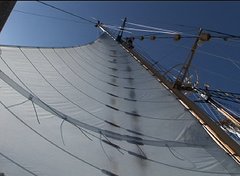I’m going to be rambling on for a
little bit here, so don’t mind me! It’s something I’ve gotten quite good at
here while sailing the seven seas, except this is a unique and rather sane
opportunity for my ramblin’ as I actually have an audience. Normally, my
ramblin’ takes place in the wee hours of the night under the star spangled
midnight sky. I can always count on a good conversation with myself to keep
myself wide-awake, alert to what may come on that horizon, and in good spirits!
And anyway, sometimes its not
ramblin’ as much as just singing. I may have just not had a good opportunity to
try it out before this, but as it turns out, singing is a fantastic way to
entertain yourself while clipped into the bow of the ship on the long midnight
look outs. Whether I’m squealing out in a disgraceful replication of Robert
Plant,
“Hey-hey Mama, I said the way you
move,
“Gonna make you SWEAT,
“Gonna make you GROOOOOVE!” soon
followed by a copious amount of “Wah-wah-wah’s!” and “Duh-nuh-nuh’s!”
As if I weren’t already sweating
enough out here. Or perhaps during my more desperate and shameless moments,
wailing out to Neptune with a voice crackly,
“What if GOD was ONE OF USSSSSS!
“Just a FOOL like ONE OF USSSSSS!”
These episodes usually last as long
as it takes for one of the daily miracles of life, beauty, or science to emerge
and distract me from my singing, as they do frequently. Like, for instance,
noticing that out in some special spots of the Pacific, stars shine not only
from above but also from below, with bursts of neon bioluminescence trying as
hard as they can to mirror the sprawling Milky Way from the depths. Or maybe
that daily phenomenon is a new and mysterious creature pulled up from the
blackness beneath us, now blobbing about indifferently in a jar of formalin.
Anyway, now for the important
stuff. As part of our Marine Conservation class, we are each giving what we
call an Uncommon Dialogue, a talk hosted
by the students on the deck of the ship as we traverse the worlds largest
ocean. My own Uncommon Dialogue, however, will take place with you, our family
and friends back home, as I will be reporting on the talks we have with
occasional blog posts.
On our way down to Palmyra Atoll (a
unbelievable place that certainly merits a later blog post of its own), our
very own Evan Clark started us out with a fascinating talk about conservation
from a planetary perspective.
Evan told us about one moment
during the Apollo 9 space mission, during which an astronaut was given the
opportunity to observe earth from afar for 5 minutes while he was alone,
floating in space. During this time, the astronaut realized that the planet he
was seeing beneath him was nothing less than a perfectly sustainable space
ship, possibly the most successful one in existence. With this in mind,
conservation is not only a social and scientific movement but also the
maintenance of our very own global life support.
Evan then posed as interesting
question. We as conservationists feel the responsibility to care for the life
on our planet, but would we have that same responsibility to care for life if
it were discovered on another planet? And what do the answers to this question
tell us about our role as the stewards of life here on earth? How far do our
responsibilities extend, and what gives us those responsibilities? After all,
as Evan told us, it was a single photograph of the earth rising over the
surface of the moon from afar that began the green movement.
Following Evan, Caroline Ferguson
started us off on a conversation about the farming and manipulating of marine
organisms, which spun quickly into a class wide debate on the potential, and
also the limits, of aquaculture.
From the perspective of feeding the
planet, aquaculture is a great accomplishment for the human race. But, as Caroline
reminded us, the situation is not so simple. Aquaculture entails the
confinement of fish to a small and usually enclosed area in contrast to the
vast oceans they are evolved for and used to. The result is in an unhealthy
buildup of byproducts and waste that pollute our waters to a dangerous degree.
And the problems do not end there. Aquaculture comes hand in hand with
selective breeding, where fish are chosen for their abilities to mature
quickly, grow large, and also develop at a favorable feed to size ratio. What
this means is that we are fundamentally changing the species we grow, and all
this is aside from the so-called “Franken-Fish,” which are explicitly
genetically modified salmon that are awaiting USDA approval.
So the question remains, how far
can we take aquaculture? As more and more selectively bred fish escape into the
wild each year, competing with the already depleted wild stocks and also
potentially muddling their gene pool with unnaturally selected traits, the
problem is growing exponentially and may soon get out of hand.
As we sail, each week will bring
about a new round of uncommon dialogues, which I will do my best to summarize
and bring to you via our blog here at sea. This is Lucas Oswald signing off,
and until our next report, be sure keep an ear to the wind. Who knows, you may
just hear me singing us down to Christmas Island.
-Lucas Oswald


No comments:
Post a Comment